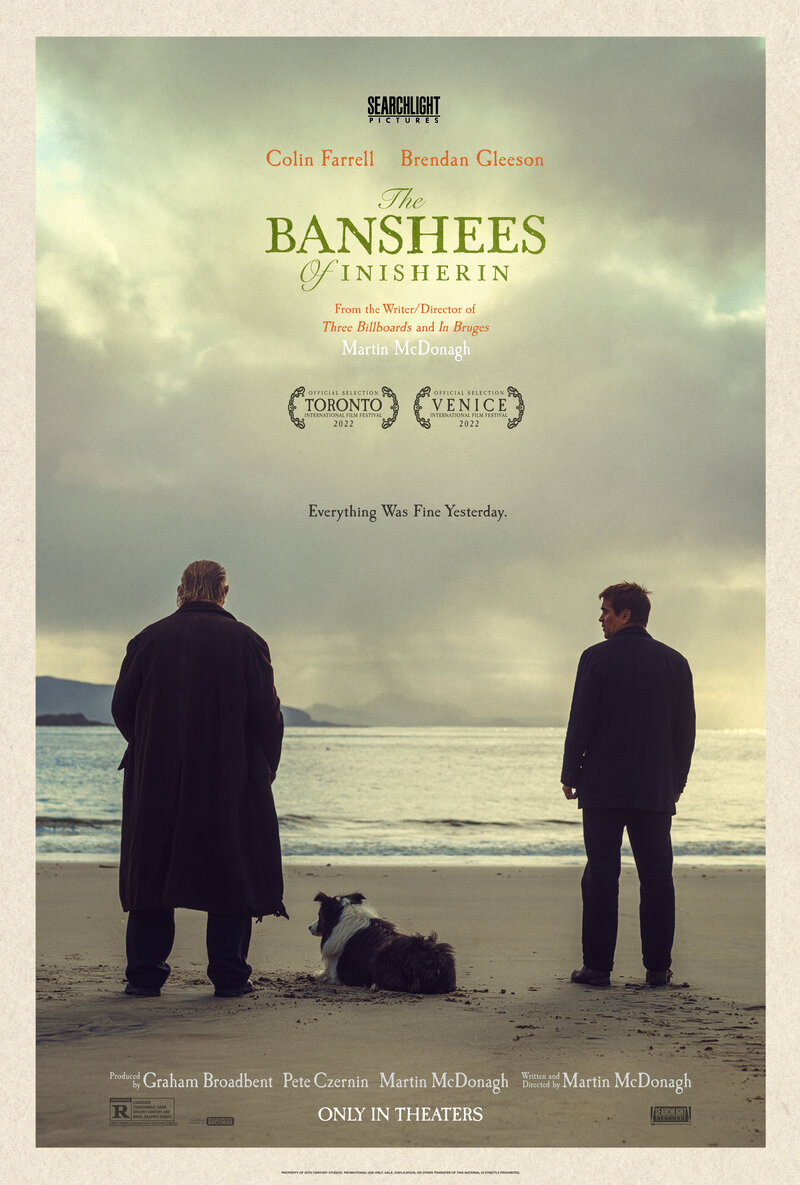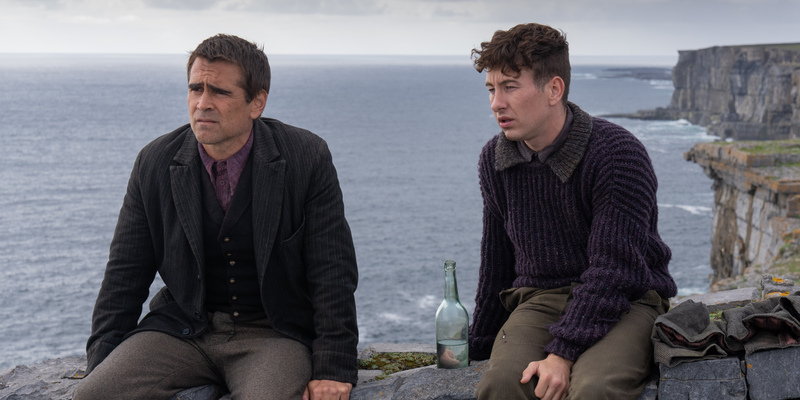
Review by
Eric Hillis
Directed by: Martin McDonagh
Starring: Colin Farrell, Brendan Gleeson, Barry Keoghan, Kerry Condon, Pat Shortt, Jon Kenny

When it was announced that English filmmaker Martin McDonagh was set
to make a movie called The Banshees of Inisherin, the entire island of Ireland let out a collective groan. Hadn't his
brother, John Michael, punished us enough with The Guard and
Calvary? Was Martin set to portray rural Ireland in the same simplistic manner as
his take on rural America with Three Billboards Outside Ebbing, Missouri? Would he follow his brother's lead and portray the Irish as a bunch of
gombeens? We are a bunch of gombeens, but that's for us to say, not some
English bloke, as if his own country doesn't have enough issues of its
own.

I took my seat at the press screening of
The Banshees of Inisherin prepared to get very annoyed very
quickly, but any fears I had were dismissed within about five minutes. Sure,
this is another of the McDonagh boys portraying us Irish as a bunch of
gombeens, but the difference here is that it's an accurate portrayal. Unlike
the cartoon Paddywackery of his brother's Irish set movies, Martin's take on
Ireland suggests he does indeed know a thing or two about the Irish
psyche.
Set on the fictional west coast island of Inisherin, the film is centred on
the breakdown of a lifelong friendship between Padraic (Colin Farrell) and Colm (Brendan Gleeson). One afternoon the former calls to the
latter's home for their usual trip to the local pub, but Colm ignores him,
sitting quietly smoking while Padraic raps on his door and windows. Later
the two meet and Colm blanks Padraic. Eventually Colm reveals that he's
decided he doesn't have time to be friends with Padraic anymore. He wants to
devote his remaining years to composing tunes on his fiddle, in the hopes
that he'll leave behind some sort of legacy, and he also finds Padraic a bit
of a dullard.

The Banshees of Inisherin takes place during the Irish Civil
War, and some have surmised that the feud between Padraic and Colm is
analogous to that conflict. I can't say I saw it that way, as to do so would
be to reduce a very complex conflict to a simple falling out, plus
McDonagh's version of the Irish Civil War seems more inspired by its larger
American cousin, with cannon fire heard from the mainland. Rather the
dispute between Colm and Padraic feels like McDonagh's commentary on our
current culture war, which is ostensibly about right versus left, but is
really more about the cultured versus the uncultured. The cultured dismiss
the uncultured as a bunch of ignorant deplorables who refuse to learn about
pronouns, while the uncultured see the cultured as a lunatic fringe of
over-educated intellectuals. Neither has any interest in examining why the
other may not share their views. Colm, who is as close to middle class as
this milieu can boast, represents the cultured; he makes a living teaching
music to visiting students, and so has time to devote his life to
high-minded activities. Padraic is a working class farmer, committed to the
land and his animals; patronisingly called one of "life's good guys," he
enjoys the simple things in life. Colm can't understand Padraic's simple
mentality, and Padraic can't fathom why someone wouldn't share his view of
life. I don't think it's an accident that the only unflawed character in the
film is Padraic's angelic sister Siobhan (Kerry Condon), who acts as
a go-between in the conflict between the two stubborn men. Siobhan sees both
men's sides of the argument and tries to find a way for them to reconcile.
She's ultimately broken by their lack of give and take and simply advises
Padraic to keep away from Colm, especially when Colm threatens to cut off a
finger every time Padraic attempts to engage with him.
McDonagh has crafted an inspired piece of tragi-comedy, as tragic as it is
comic. It's beautifully played, with Farrell delivering what might be his
finest performance to date. Miscast by Hollywood early on in his career as a
conventional leading man, Farrell has settled into something between leading
man and character actor, and is arguably more suited to the latter despite
his good looks. In recent years he's become one of the screen's most
sympathetic performers, and there are some moments here that are genuinely
heartbreaking. Condon, an actress who has always impressed in minor parts,
is given a role worthy of her talents here and leaves an indelible mark on
the viewer (after my screening there were many questions of "Where do I know
the sister from?" from attendees). You might even argue that the film is
really Siobhan's story, as it becomes not so much about whether Colm and
Padraic will reconcile but rather if Siobhan can get away from this damn
island and live her own life. Barry Keoghan gets the film's biggest
laughs as Dominic, the island's idiot, while Sheila Flitton is
suitably banshee-like as the island's version of the sort of prophets of
doom once played by Maria Ouspenskaya.

The movie's title is also the name of a fiddle piece Colm composes. Colm
confesses the title is meaningless, but that he likes the "double sh" sound.
This moment comes off as McDonagh's sly wink to an Irish audience accustomed
to seeing their country portrayed in romantic terms through misty foreign
eyes. There's nothing romantic about McDonagh's film, but unlike those of
his brother, it's never cruel or cynical, simply an honest, observant take
on how messed up we all are, whether Irish or not.


